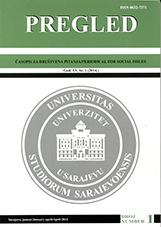Obnova carskog duhovno-političkog identiteta Rusije i njegove refleksije na Bosnu i Hercegovinu
The Renewal of Russian Tsarist Spiritual and Political Identity and its Effect on Bosnia and Herzegovina
Author(s): Enver HalilovićSubject(s): Politics / Political Sciences
Published by: Univerzitet u Sarajevu
Keywords: Slavism; Eurasian orientation; pro West orientation; “Eastern Question“; “Global Balkans”; Putinization
Summary/Abstract: Putin’s modern Russia has undergone a distinctive retraditionalization of its power at the geopolitical Euro-Asian, Central, Southern, Southeastern and Near Eastern area named by Zbigniew Brzezinski the “Global Balkans”. The Russian interest of special importance is building the strong barrier against the Atlantic oriented military and political power’s access to this area of centuries long Russian influence. Its influence on international relation has already resurfaced, particularly in its vicinity, closer and farther geo environment. Former Soviet diplomacy’s communist ideology replaced the muscle coming from tangible natural resources – oil and natural gas in one hand, and, in the other, its geographic placement in relations between the East and West in broadest culturological and geopolitical terms. The mutual determination and dependence of our internal political situation and military and political forces’ international diplomatic relations result in long BH political skating on thin ice. The Russian Federation remained neutral when West declared the war on Islamic terrorism, however it has gained hugely important military and political role in effect. The West is “forced” to tolerantly approach and make exceptions in favor of the Russian Federation, not just because of West’s waging the war against Islamic terrorism, but due to its deficiency of energy sources.
Journal: PREGLED - časopis za društvena pitanja
- Issue Year: LV/2014
- Issue No: 1
- Page Range: 65-77
- Page Count: 13
- Language: Bosnian

